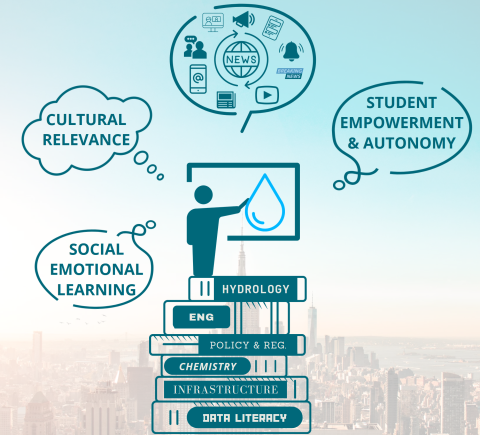Body
Image

Digital Empowerment: Can Governmental Agencies Data Platforms be Leveraged in Classrooms to Respond to Current Events?
Over the last ten months, students in New York City schools have experienced several days of haze due to wildfires, repeated urban floods, an earthquake, and an eclipse. Between fear mongering news and social media posts, students and educators may be left with a sense of confusion, if not gloom. We posit that the use of interactive information platforms from state and national agencies (e.g., NOAA, USGS, NYSDEC) can fill an information gap in real time, favorable to student-driven inquiry, civic education, and career discussions. Connections with curricular content together with digital navigation skills may transform hazardous conditions to an empowering experience, for both students and teachers.
Pillar 1: Innovative Use of Technologies in Learning and Teaching
Educators often rely on the use of news articles or videos to make connextions with current events. Data sets, on the other hand, are often curated, transformed or created to meet the classes need. In our project, we explore the possibility of an authentic learning experience via the use of institutional data platforms. From interactive maps to agency portals, students and educators are exposed to up-to-date measurements, sampling or reporting gaps, regulatory context, and overal data and digital literacy needs.
Pillar 2: Partnerships for Career and Workforce Preparation.
The use of authentic institutional platforms lead to explicit conversations around the source and use of the information. Students are directly exposed to a potential employer, but also invited to think about the various professions involved in the prevention, response, mitigation, regulation of these events. In addition, students are developing data literacy and navigation skills, a necessary step towards a digitally competent workforce including accessing career tools and job applications.
Pillar 3: Strategies for Equity in STEM Education
Our work takes place at the Eagle Academy for the Young Men of Harlem, a male-only predominantly Black and Latino public high school in NYC. We, teachers and researchers, have noted that the lack of cultural relevance of curricular content can be alleviated with data platforms. Developing data literacy and critical thinking skills is necessary for students to not only succeed in their STEM education, but also to tackle and address inequities (e.g., lack of, biased or underused data).

Discipline(s)
Computer and informational technology science
Data Science
Engineering
Environmental sciences
Interdisciplinary
Target Gradespan(s)
Middle school (6-8)
High school (9-12)
Target Participant(s)
Youth / students
Educators
Black/African American participants
Hispanic/Latino participants
Project Setting(s)
Formal Education
Category
Developing and Testing Innovations (DTI)